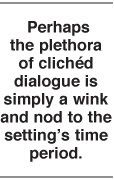Let’s be frank for a moment: I’m not married, engaged nor in the process of settling down. I’m dating, but in turn still searching and wondering whom the mystery guest will be that I’ll spend my years waking to every morning.
I do not, however, think that Harry (Chris Cooper) thought about the true meaning of settling down when he married Pat (Patricia Clarkson). Maybe he thought she’d change her ways in seeing that love means only one thing: “sex.” As long as she’s happy in the sack, her heart is content. But as the saying goes regarding attractions, Harry is exactly the opposite: a sad romantic who as of late has been committed solely to his wife.
Harry is so pathetic in fact, that he can’t even stand to serve his horny honey with divorce papers, simply because it’ll hurt her too much and he couldn’t stand to see her go through the process. That’s where Harry’s true romanticism comes into full unselfish force: rather than break his wife’s heart and provide her social shame (divorce wasn’t always popular) he’d rather kill her.Now that’s love.

The direction by Ira Sachs, just as the performances, seemed to have been done over the phone, falling totally flat and without any interesting inventions to draw the audience in. He relies solely on his actor’s good looks, and sadly even the eyes of Rachel McAdams’ soft face can’t lift the spirit of the film.
The script, co-written by Sachs and Oren Moverman, is stuffed full of verbal clich’eacute;s and odd movements, maybe taken directly from the novel it was adapted from (“Five Roundabouts to Heaven” by John Bingham). Perhaps the plethora of clich’eacute;d dialogue is simply a wink and nod to the setting’s time period, in the era when these lovely layers of prose were original, but again only mimic a swan dive that crumbles into a belly flop.
Guiding us like a lost puppy is narration from Harry’s best friend and confidant, Richard (Pierce Brosnan).
Brosnan has floated through odd roles; but in “Married Life,” he inhabits the 1940s setting with a pizzazz and jaw-swaying verbose that would make Bogart proud.
Explaining his friend Harry’s woes and complicated situation, Richard narrates with comfort from a perspective we’ve all sat in. But rather than act as an unreliable narrator, Richard seems to neither have a definitive answer nor explanation for why Harry would do such a thing, other than he’s a romantic and his heart bleeds for others in pain.
The film tumbles along rather plainly, acting as a window for the viewer to peek into and dissect, often presenting us with interesting framing but a lack of movement. The film leads our noses rather than splashing our senses with dashes of truth and humor, and instead pushes the audience into accepting the different genres it tries to pull off. When set up as a dark comedy, “Married Life” continues into a blunder of mixtures with excellent ingredients but an awful recipe. Attempts at a thriller and even suspense fall flat. Perhaps I’m not of the intended demographic, however by the end of the film we’re simply supposed to accept the crap of life and move on. Which is a valuable lesson, but presented in too sour a package to enjoy the sweet interior.





